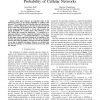Free Online Productivity Tools
i2Speak
i2Symbol
i2OCR
iTex2Img
iWeb2Print
iWeb2Shot
i2Type
iPdf2Split
iPdf2Merge
i2Bopomofo
i2Arabic
i2Style
i2Image
i2PDF
iLatex2Rtf
Sci2ools
157
Voted
ICC
2009
IEEE
2009
IEEE
Impact of Topology and Shadowing on the Outage Probability of Cellular Networks
This paper proposes an analytical study of the shadowing impact on the outage probability in cellular radio networks. We establish that the downlink other-cell interference factor, f, which is defined here as the ratio of outer cell received power to the inner cell received power, plays a fundamental role in the outage probability. From f, we are able to derive the outage probability of a mobile station (MS) initiating a new call. Taking into account the shadowing, f is expressed as a lognormal random variable. Analytical expressions of the interference factor's mean mf and standard deviation sf are provided in this paper. These expressions depend on the topology of the network characterized by a G factor. We show that shadowing increases the outage probability, and using our analytical method, we are able to quantify this impact. However, we establish that the network topology, or correlated received powers, may limit this increase.
Communications | ICC 2009 | Interference Factor | Other-cell Interference Factor | Outage Probability |
Related Content
| Added | 18 Feb 2011 |
| Updated | 18 Feb 2011 |
| Type | Journal |
| Year | 2009 |
| Where | ICC |
| Authors | Jean Marc Kelif, Marceau Coupechoux |
Comments (0)

